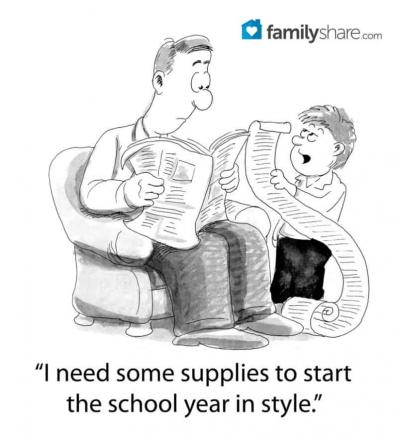
Equally important to teaching about savings and investing is teaching our kids about borrowing. Frankly, the Nancy Regan message of "Just Say No!"� will not cut it. You are wasting your breath when you lecture, "Now sweetheart, credit cards are a tool of the devil. Stay away from them."� Sure, that ought to work. Until she gets that envelope in the mail addressed personally to her (so exciting!) and it really is a great card and she's not really going to USE it, she just wants to have it for emergencies. And away you go.
In order to be independent, a young adult needs a working knowledge of borrowing. A prepared young adult is a safe young adult.
Secret #1 teach them by experience
By about age 11 or 12, begin to discuss credit and paying interest. They are much more capable of understanding at this point.
A great way to teach is to set up a great learning experience. At around this age, kids want bigger, cooler stuff. Let them pick something big and cool and expensive. It's usually like a bike, iPad or something. We then say,
"Honey, the Family Bank would be delighted to make you a loan."�
They're flabbergasted. "Really?"�
"Absolutely,"� we say.
Then we enter into loan negotiations. We talk about collateral ("And if you don't pay, we get to keep your iPad which we will sell on eBay."� Bless eBay.). We talk to them about interest to be charged (and we make it PAINFUL. Minimum is 20 percent.) We talk about payments. And then we set up a promissory note (you can get them on the Internet or make up a simple one of your own) and we have them sign it. And away we go.
This lesson works so well because they usually absolutely hate it. They get to really resent those payments and the reminders that they will lose their collateral. They despise paying the interest - which we point out with glee. ("Look honey, we just made five bucks for doing nothing! Woohoo!"� Mom and Dad high-five each other.)
You usually only have to teach this lesson once. It makes an indelible impression on how horrible it is to be in debt. But sometimes mini-lessons work well to reinforce this.
"Sure I'll loan you $5 but you have to pay me $10 by Saturday."�
"But that's highway robbery!"�
"Take it or leave it."�
"But I really want to go to the movies."�
"Sounds great, do we have a deal?"�
"Fine."�
Come Saturday. "Pay up, you owe me $10."�
"Daaaad. That's so not fair."�
"Yup."�
Grumbling ensues. Payment made. Dad goes skipping to Mom for their high-five party, "Look, I got $5 from Suzie for loaning money. Woohoo."�
Secret #2 make it unappealing
This is a strange teaching experience. You want your children to so despise having to pay interest that by the time they are 18, those credit cards do not appeal to them. They've learned how much it really costs and how awful it is to have debt hanging over their heads.
The very best way is for them to have experience with what debt really is. And you want it to be a lousy experience so be sure and construct it that way. None of this, "Boy, Mom and Dad only charged me 2 percent interest. This 'loan' business is great!"�
Debt is a serious problem. It is crippling many, many people in the world. To quote Pubilius Syrus, "Debt is the slavery of the free."�
These lessons must be taught with clarity. Children usually won't learn how it works unless they experience it. They must be taught the difference between "good debt"� (mortgage, car loan) vs. "bad debt"� (credit cards, consumer debt). So teach them all about what a mortgage is and how it works. If you're refinancing your house, have them go along with you and talk about it.
Secret #3 teach them about compound interest - the lender that never sleeps
The most important borrowing lesson they can learn is on compound interest as it relates to borrowing. This is the lender that never sleeps. Have them do the math. Have them "charge"� a DVD and then calculate how much it would take to pay it off at the end of a year on the credit card with compound interest. It is incredible. They need to SEE those numbers and calculate them on their own.
Again, lessons learned by other people can be shared and those stories will stick with the kids. They'll never forget hearing about Cousin Louis who stuck his motorcycle on a credit card and ended up paying five times what it cost and could have had FIVE motorcycles. The good and the bad. Caution here - do not dwell on your own negative experiences. Children need to feel security from their parents and they will lose this completely if you spill all about your current desperate circumstances. Do NOT burden them with your current debt concerns.
Teaching our children about borrowing is a critical activity. We must protect our children and their future. That starts with knowledge and experience right now.

